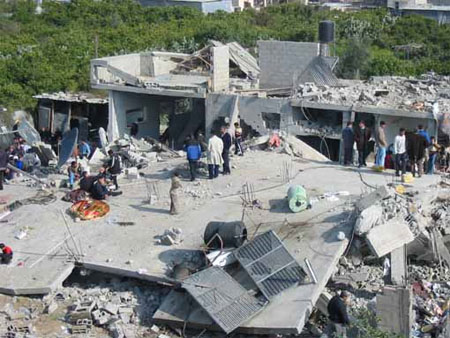
Photo: PCHR
|
 Photo: PCHR |
| Na'ima al-Helou, Fayrooz 'Arifi and Mazjouna, Jabaliya camp, April 20:
|
|
I In Jabaliya camp, one of the two largest in Gaza, I meet two women ex-prisoners. Prison is the most extreme type of coercive displacement, and particularly tough for women, because of the use of threats and fear of rape. Hundreds of Gazan women were detained or imprisoned in the course of the Israeli occupation. I tried to meet one of them in Rafah, Aisha Kurdi, famous for having given birth in prison. I went twice to her home, but missed her each time - it was a period of anger over Israel's continued detention of prisoners, with activists going daily to protest meetings in Gaza city.
In Jabaliyya, someone makes me an appointment with Na'ima al-Helou, a well-known nationalist militant who lost an eye and a hand while handling explosives, and spent many years in prison. Now, post-Oslo, she directs a training workshop for war-disabled and young people in Jabaliyya camp. She invites us to meet her in the home of a fellow prisoner Fayrooz 'Afifi. Fayrooz is co-wife to Mazjouna. They tell me that Mazjouna chose her because she hadn't given birth to any children. Their husband is a driver and long-term activist. Unfortunately, no children have been born yet. Since this is a group recording, the speakers don't go into detail about their early lives, but focus on their experiences in the national struggle. Na'ima gives a factual, impersonal record of her life as a series of imprisonments, with dates and names of prisons, but little else. Such chronologies hide more than they tell, but I reflect that they are the result of party discipline. If there were time to develop them, they would surely blossom into fuller, more personal, more nuanced accounts.
Na'ima begins: Mazjouna's account offers a foil to |
Na'ima's. Mazjouna has never been a member of a Resistance group. Her activism sprang from being married to an activist, and accompanying him on missions. She experienced detention and interrogation. Her husband was imprisoned twice. Her language is different from Na'ima's, more colloquial, less moulded by national movement ideology. She criticizes women who create problems through jealousy, who often don't sympathize with their husband's political struggle. She doesn't talk about the exclusion of women from the 'public sphere' by the 'patriarchal family'. On the contrary, she says that what a woman does is up to her, she can struggle 'from her place'; it's hypocrisy to blame others if she doesn't act. Her words trigger no argument. Though 'organized', the other two women obviously love and respect Mazjouna. As we leave, Fayrooz whispers to me that Mazjouna is ill.
Majzouna begins: "After the war of 1967 it was clear that Israel wasn't going to leave the young men of Gaza in their homes. What did the occupation do? After eight at night they would gather the young men and put them in lorries and take them on the road to Egypt, and throw them out there. Young people began to leave, and families began to be afraid for their daughters, because Israel threatened them with violations..." |
[Umm Muhammad] [Ahmad Abdallah] Copyright©2005 |
|